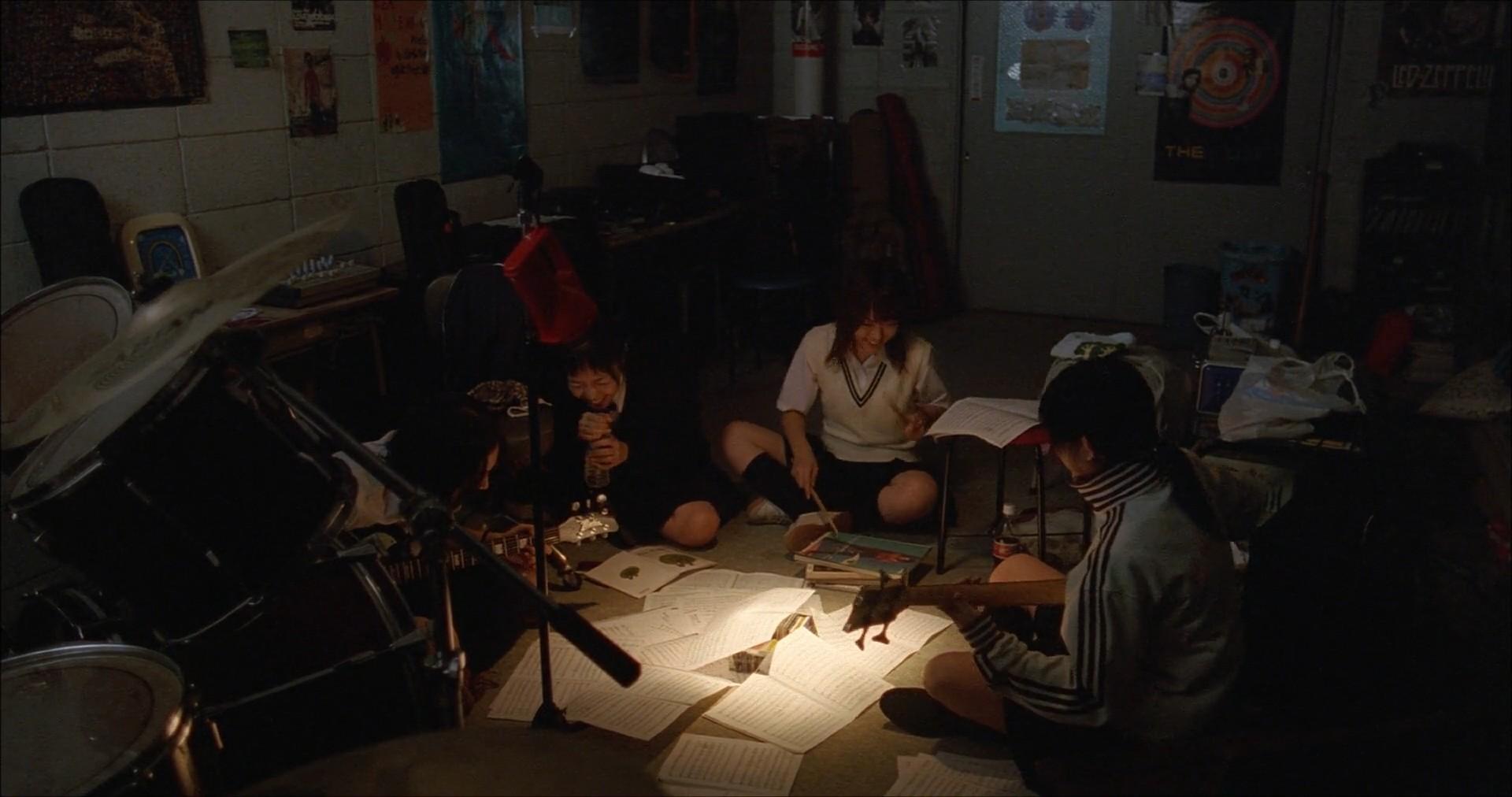
Linda Linda Linda is a 2005 film about a Japanese high school band in the 3 days running up to a performance at the end of their senior year, at the conclusion of the multi-day Holly Festival. Their guitarist Moe has injured her hand and their singer Rinko has quit over a falling out with the keyboardist Kei, but rather than cancel the show they make a pivot - Kei will play guitar, and they ask the first person who walks by to sing for them - Son, the Korean exchange student.
Son's Japanese is bad enough that she didn't know what she was agreeing to, and Kei can't play guitar. They decide that rather than performing an original track as planned they'll cover the Blue Hearts, a punk band everyone knows.
Linda Linda Linda is about the things the film doesn't say it's about, because people don't usually tell us when we're having the best days of our lives and we resent it when they do. Throughout the film, people in the periphery of the band's scramble know how important this show will be for them, how the moments they're sharing can't be taken for granted, and any attempt to explicitly address this idea is shut down with the ruthlessness of a teenage girl disinterested in taking things so seriously.
I went into Linda Linda Linda expecting to enjoy it, I was primed by the googling I did after hearing about it, but I wasn't ready for it to sit in the back of my mind the way it has. It's an exceptionally simple story, with low stakes and a sparseness to its pacing - the editing has a film-student's love of lingering shots and extended pauses. The awkwardness of teenage socialisation against the raw emotional expression of punk rock hits extremely hard.
Throughout we get snippets of the Film Club documenting the festival, the director's confident incompetence mirroring those careful, measured, awkward silences.
These are the moments that make us - clumsy as they are, they lay the foundations of the people we will be.
Linda Linda Linda is available, with subtitles, on archive.org. The Blue Hearts are not on Spotify.
✉️ Reply via email
This is a format I'm trying where I get out relatively incomplete thoughts on a topic I may or may not explore more later
Spoilers for 2 30+ year old movies I guess?
In the last few weeks, I've seen Terminator and Terminator 2 in the cinema, two films I haven't seen in the better part of a decade. The last time I saw either was actually also at a cinema, as part of a 6-movie Arnie All-Nighter at the Prince Charles Cinema in Leicester Square. Fun symmetry! Though this duo was were the finale of the 12 hour screening, so I wasn't watching under ideal circumstances back then. That said, these are both films I saw multiple time long before I was supposed to, as a childhood Arnie superfan.
Watching them again recently, with the benefit of an extra 10 years of experience, I had a few thoughts.
- Terminator really holds up. I felt this last time too tbf, and the sleep deprivation may have heightened this. It's a supremely focused film, super intense, and imo entirely un-Hollywood in its presentation. It's weird, the audio design is grating, and it just doesn't let up. A real triumph, I truly wish James Cameron did more work on this scale.
- One of the only Narratively Necessary Sex Scenes in cinematic history, fair play Jim.
- I love how the first half of T2 mirrors the overall arc of T1 - the truck chase with a firey conclusion, the terminator walking out of the flames (bloopy metal this time, ooo), the climactic escape wherein the terminator loses a hand (temporarily? ohhhh), and the escape to the Mexican border - with the kind of questionable-in-the-sequel Sarah Conner voiceovers - before it's ruined and they have to go back and perform an act of domestic terrorism. It's T2 now baby, T1 is over both literally and narratively. Then the film climaxes with a truck chase and the opposite of a fireball.
- The scene where Sarah can't kill Dyson really caught me off guard - it never really clicked for me before that she's stopping because she sees herself as a terminator in that moment, killing a man to get the future she wants. That John comes in and immediately goes to her side, and they're not angry at each other - they're on the same page, they know what they're going to do and trust each other to do it. I feel like this scene is the heart of the whole thing, in a way I never appreciated before - it was always kind of a road-bump in the pacing to me.
- The whole foundry sequence fucking rules, just extremely good cathartic story telling. The audio design is beautifully awful here.
- It's such a tragedy that they made more movies after this. Hell, I'd say that T2 was a massive roll of the dice - the first film leaves the door open somewhat but it was a hard act to follow. They kind of nailed it with T2 but they also nailed the door shut for a sequel imo. T3's hand wavey "nah you just delayed it lol" feels honestly fair given what we know about technologists and the US military, but I still feel let down by the film even if I enjoy it a reasonable amount, and what came after was borderline unwatchable. The story was so sewn up. Speaking of...
- I really liked the kind of misplaced optimism of the ending of T2. The apocolypse has been solved, and that outweighs any bad results, but also John's life is gonna suuuuuuuuck. I honestly can't even recall how they handwave that away in the sequel, gonna assume "false identity" and move on like they probably did.
